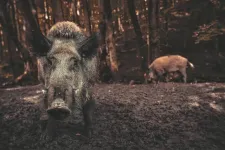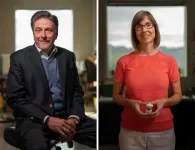Supermassive black holes put a brake on stellar births
2021-07-20
(Press-News.org) Black holes with masses equivalent to millions of suns do put a brake on the birth of new stars, say astronomers. Using machine learning and three state of the art simulations to back up results from a large sky survey, the researchers resolve a 20-year long debate on the formation of stars. Joanna Piotrowska, a PhD student at the University of Cambridge, will present the new work today (Tuesday 20 July) at the virtual National Astronomy Meeting (NAM 2021).
Star formation in galaxies has long been a focal point of astronomy research. Decades of successful observations and theoretical modelling resulted in our good understanding of how gas collapses to form new stars both in and beyond our own Milky Way. However, thanks to all-sky observing programmes like the Sloan Digital Sky Survey (SDSS), astronomers realised that not all galaxies in the local Universe are actively star-forming - there exists an abundant population of "quiescent" objects which form stars at significantly lower rates.
The question of what stops star formation in galaxies remains the biggest unknown in our understanding of galaxy evolution, debated over the past 20 years. Piotrowska and her team set up an experiment to find out what might be responsible.
Using three state-of-the-art cosmological simulations - EAGLE, Illustris and IllustrisTNG - the astronomers investigated what we would expect to see in the real Universe as observed by the SDSS, when different physical processes were halting star formation in massive galaxies.
The astronomers applied a machine learning algorithm to classify galaxies into star-forming and quiescent, asking which of three parameters: the mass of the supermassive black holes found at the centre of galaxies (these monster objects have typically millions or even billions of times the mass of our Sun), the total mass of stars in the galaxy, or the mass of the dark matter halo around galaxies, best predicts how galaxies turn out.
These parameters then enabled the team to work out which physical process: energy injection by supermassive black holes, supernova explosions or shock heating of gas in massive halos is responsible for forcing galaxies into semi-retirement.
The new simulations predict the supermassive black hole mass as the most important factor in putting the brakes on star formation. Crucially, the simulation results match observations of the local Universe, adding weight to the researchers' findings.
Piotrowska says: "It's really exciting to see how the simulations predict exactly what we see in the real Universe. Supermassive black holes - objects with masses equivalent to millions or even billions of Suns - really do have a big effect on their surroundings. These monster objects force their host galaxies into a kind of semi-retirement from star formation."
INFORMATION:
[Attachments] See images for this press release:

ELSE PRESS RELEASES FROM THIS DATE:
2021-07-20
The case of a patient who experienced two facial palsies - one after the first and another after the second dose of the Pfizer-BioNTech COVID-19 vaccine - strongly suggests that Bell's palsy (facial nerve palsy of unknown cause) is linked to the Pfizer-BioNTech vaccine, doctors write in the journal BMJ Case Reports.
They describe the first case to be reported in the medical literature of two separate unilateral facial nerve palsies, where muscles on one side of the face become weak or paralysed, occurring shortly after each dose of a COVID-19 vaccine.
"The ...
2021-07-20
Although lockdowns are undoubtedly associated with health harms, their impact on health is unlikely to be worse than the impact of the COVID-19 pandemic itself, concludes a review published in the online journal BMJ Global Health.
During the COVID-19 pandemic, there has been an ongoing debate around whether the benefits of government "lockdowns"- either stay-at-home orders or interventions restricting movement - in reducing infections are outweighed by the negative impacts on the economy, social structure, education, and mental and physical health. In a nutshell, whether "the cure is worse than the disease."
In this narrative review, an international team of doctors examine the ...
2021-07-20
One in eight children have mental disorders that cause symptoms and impairment and therefore require treatment, but even in high-income countries most of these children will not gain access to services to treat them, reports a study published in the journal Evidence-Based Mental Health.
Mental disorders that start in childhood and adolescence can significantly interfere with wellbeing and development.
Despite the social and economic implications of not addressing these disorders, including long-term healthcare costs, justice system costs and the loss of human potential, mental health service provision for children continues to lag behind provision of services for physical ...
2021-07-20
Below please find summaries of new articles that will be published in the next issue of Annals of Internal Medicine. The summaries are not intended to substitute for the full articles as a source of information. This information is under strict embargo and by taking it into possession, media representatives are committing to the terms of the embargo not only on their own behalf, but also on behalf of the organization they represent.
1. Rapid screening, face masks may prevent SARS-CoV-2 transmission at indoor mass-gathering events
Abstract: https://www.acpjournals.org/doi/10.7326/M21-2278
URL goes live when the embargo lifts
An observational study in Barcelona, Spain found that implementation of same-day rapid screening, use of face masks, and improved ventilation was ...
2021-07-19
Although people in early 2020 hoarded toilet paper, washed their hands incessantly, and wouldn't leave home, 11 months later the public pushed the envelope on COVID-19 safety precautions and ignored warnings as time went on, a new University of California, Davis, study suggests.
Researchers in the Department of Communication examined people's reactions and expressions of anxiety about news articles on Twitter. Additionally, they investigated reactions to fear-inducing health news over time, despite the steadily rising COVID-19 death toll, said Hannah Stevens, a doctoral student in communication and lead author of the paper.
The paper, "Desensitization to Fear-Inducting COVID-19 Health News on Twitter: Observational Study," ...
2021-07-19
Two common practices in the U.S. restaurant industry -- service with a smile and tipping -- contribute to a culture of sexual harassment, according to new research from the University of Notre Dame.
"A perfect storm: Customer sexual harassment as a joint function of financial dependence and emotional labor" was recently published in the Journal of Applied Psychology from Timothy Kundro, assistant professor of management and organization at Notre Dame's Mendoza College of Business.
In the study, co-authored by Alicia Grandey and Vanessa Burke from Penn State University and Gordon Sayre from Emlyon Business School in France, more than 66 percent of restaurant employees reported facing some form of sexual harassment in the past six months.
Previous ...
2021-07-19
By uprooting carbon trapped in soil, wild pigs are releasing around 4.9 million metric tonnes of carbon dioxide annually across the globe, the equivalent of 1.1 million cars.
An international team led by researchers from The University of Queensland and The University of Canterbury have used predictive population models, coupled with advanced mapping techniques to pinpoint the climate damage wild pigs are causing across five continents.
UQ's Dr Christopher O'Bryan said the globe's ever-expanding population of feral pigs could be a significant threat to the climate.
"Wild pigs are just like tractors ploughing through fields, turning over soil to find food," Dr O'Bryan said.
"When soils are ...
2021-07-19
Research conducted at the Sharon Eccles Steele Center for Translational Medicine (SCTM) at the University of Utah's John A. Moran Eye Center explains why people carrying a block of genetic variants strongly associated with the development of age-related macular degeneration (AMD) may develop the disease and identifies a potential therapeutic pathway for slowing or even reversing disease progression.
AMD is a major cause of irreversible blindness worldwide and the leading cause of blindness for Americans aged 55 and over. Following more than 15 years of research that has employed an extensive repository of donated human ocular ...
2021-07-19
A new approach to analyse satellite measurements of Earth's cloud cover reveals that clouds are very likely to enhance global heating.
The research, by scientists at Imperial College London and the University of East Anglia, is the strongest evidence yet that clouds will amplify global heating over the long term, further exacerbating climate change.
The results, published today in Proceedings of the National Academy of Sciences, also suggest that at double atmospheric carbon dioxide (CO2) concentrations above pre-industrial levels, the climate is unlikely to warm below 2°C, and is more likely on average to warm more than 3°C.
Pre-industrial CO2 levels were around 280 ppm (parts per million), ...
2021-07-19
Throughout history, people of different cultures and stages of evolution have found ways to adapt, with varying success, to the gradual warming of the environment they live in. But can the past inform the future, now that climate change is happening faster than ever before?
Yes, say an international team of anthropologists, geographers and earth scientists in Canada, the U.S. and France led by Université de Montréal anthropologist Ariane Burke.
In a paper published today in the Proceedings of the National Academy of Sciences, Professor Burke and her colleagues ...
LAST 30 PRESS RELEASES:
[Press-News.org] Supermassive black holes put a brake on stellar births


